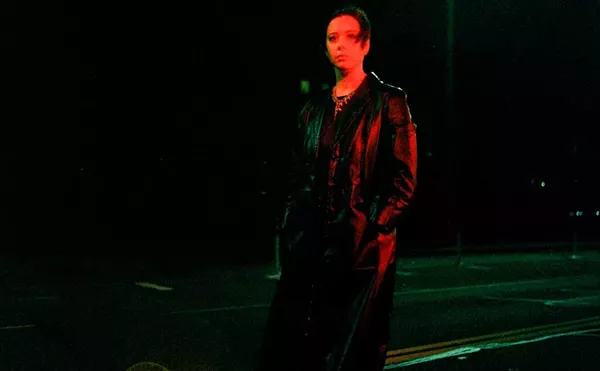
Audio By Carbonatix
[
{
"name": "GPT - Leaderboard - Inline - Content",
"component": "35519556",
"insertPoint": "5th",
"startingPoint": "3",
"requiredCountToDisplay": "3",
"maxInsertions": 100,
"adList": [
{
"adPreset": "LeaderboardInline"
}
]
}
]
John Arnold admits he’s got a few bad habits. Like a lot of musicians who cut their teeth in Detroit music, he drinks, smokes, talks shit, and has a penchant for the word “motherfucker.”
The 33-year-old guitarist, producer and part-time DJ has spent enough time gigging in bars and seedy nightclubs in the last 15 years to pick up a lifetime’s worth of bad habits.
It’s all part of who the celebrated man is: a guy who clawed his way to success out of the Detroit music scene, changing genres and enduring jeers along the way. He’s traveled the world as a musician and has returned with the wisdom to be a better composer, to be a better person.
While he’s slowly becoming a household name in the global electronic community, his initial jump point in Detroit music was through jazz. Arnold was fresh out of high school, hungry to take advantage of what Detroit had to offer and try his hand at being a jazz musician. He didn’t care what anybody thought. “I just started playing,” Arnold says, matter-of-factly.
Though he was studying jazz and music theory by day at Wayne State University, he had living legends handing his ass to him at night.
“I used to go to the Monday night jam sessions at Alvin’s back in the day and get my ass torn up by all these great musicians,” he says. “James Carter would be there, Marcus Belgrave, Pamela Wise — fucking everybody would be at the motherfucker. It was treacherous, man; really scary ’cause those are some of the baddest motherfuckers in the world. And it was weird but I would just go and sit in, and fucking James Carter would be screeching at me and shit. There were some brutal nights. It was like, even if you could hang, it was super-intimidating. But it was also the best way to learn.
“I think the jazz scene is starting to become a bit more lenient in some regards, but for the most part, if you can’t play your shit, cats aren’t going to hesitate telling you to get the fuck out.”
While his initial experiences as a guitarist in the jazz world were not always pretty, Arnold says he gained an appreciation for serious Detroit musicians, and of hard work.
He then started two of his own groups; the world music quintet Blackman and Arnold in 1995, and the more freeform Jazzhead in 1996. Local audiences might recognize Blackman and Arnold; they gig incessantly throughout metro Detroit. The group, which is heavily focused on experimental world music, plays Latin funk, Afro-Cuban rhythms and a wide range of West African musical styles, using such accomplished musicians as Senegalese bassist and vocal virtuoso Pathe Jassi to keep its sound grounded. They’ve sold more than 10,000 records locally, which is miraculous considering the genre.
Jazzhead managed to bring a rawer pitch to contemporary acid jazz, with a more untreated style that eventually helped them win hearts in the local jazz community. The band understood Arnold’s abstract concepts and could play everything from jazz to various forms of funk and nu-wave disco.
“The Jazzhead shit really got started ’cause at the time, I remember hearing about acid jazz and being really intrigued by it,” Arnold says. “But I remember hearing it. It was nothing like I thought it would sound. I thought it would be a little harder, a little more raw, but it was kinda pussy in my opinion. And I wanted to start a band that was sort of hard-edge, that could emulate what the DJ’s were doing and still keep it dancefloor.”
Arnold and Jazzhead keyed into the future of music sounds, and gained local respect because of it.
“All the guys in the jazz community could see what we were doing and they were coming to our gigs consistently. Ralphe Armstrong, Marcus Belgrave and Harold McKinney would sit in from time to time. Harold was like, ‘This music is the shit!’ That was my avenue for respect.”
Jazzhead was to sign a deal with Carl Craig’s Planet E label in 1997, but things got mucked up. Arnold opts not to talk about it, but he does credit Craig with helping him on his own electronic career. The two have worked together in various ways, and Craig was instrumental in introducing Arnold to a number of innovators within Detroit’s electronic community. Through Craig, Arnold sparked a relationship with techno linchpin Derrick May.
In 2000, Arnold ended up releasing his first electronic EP, Sparkle, on Fragile, which is part of May’s Transmat label. The record came out six months after Jazzhead lost its momentum and fell apart. The band still performs but most of the original members, including Arnold, have long since split.
Around that time, Arnold was beginning to form relationships with such electronic second-gen stars as Theo Parrish, Amp Fiddler, and Stacy Pullen. Transmat was the perfect temporary residence for Arnold’s sound; May let the then 27-year-old experiment with whatever style he pleased. The freeness of late ’90s techno impressed Arnold and inevitably pushed him toward the broken beat sound he’s now known for around the globe. He’s since formed alliances with the Bugz in the Attic crew, West London’s broken beat gurus, and the BBC’s respected radio DJ Gilles Peterson has been giving Arnold airplay love.
But don’t think that Arnold is overly giddy about being an electronic scene darling now that his music is suddenly hot — Arnold can’t help but express frustration born of bouncing between genres and looking for recognition.
“I don’t know, man, I think the electronic scene here is some of the most fucking elitist vibes I’ve ever felt in my life,” Arnold says. “A lot of folks are flossing, people are fronting, and sometimes shit just isn’t cool.”
It’s easy to tell, shit-talk aside, that Arnold, like many musicians, is tired of the crabs-in-a-bucket mentality that often permeates Motor City music scenes.
“I see the rich heritage this motherfucker [Detroit] has,” Arnold says. “Everything that comes from here has influenced the world, in every genre of music, and that’s amazing. But you’re always gonna have your haters and shit. Detroit is a hard motherfucker for musicians to get off from. People are always saying, ‘Why does that motherfucker get all the hype when I’m just as talented as he is?’”
He’s speaking the truth. With this in mind, Arnold signed with California-based jazz and future-music label Ubiquity Records in 2002. The label sports an impressive roster of Detroiters, including Platinum Pied Pipers, Theo Parrish and Jeremy Ellis. It’s a perfect home for the evolution of Arnold’s style. His first Ubiquity album, Neighborhood Science, was well received among peers and music critics. Glowing words on Neighborhood graced trendy music rags, some as far away as Moscow (where Arnold played to a sold-out crowd last year.)
More than a showcase of his own musical growth, Neighborhood took Arnold around the world, where he was able to detect, nightclub by nightclub, what’s hot in global dance. Results of his “nocturnal” studies became the motivation behind his latest album, Style and Pattern; its sonic landscapes land somewhere between world crunk and acid lounge. He collaborates with the U.K.’s Nigerian hip-hop sensation Ty, Puerto Rican vocalist Totin (from bomba group Son Del Batey) and fellow Blackman and Arnold cohort Jassi.
Local musicians include Wendell Harrison and Jeremy Ellis, plus longtime amigos Malik Alston and Paul Randolph. Style isn’t intrinsically different from Neighborhood Science, though it might be more danceable.
“Sonically I think it sounds better. It’s more fluid. It’s tighter, beat-wise,” Arnold says. Of course, any conversation with Arnold isn’t without the brutal, if not welcome and self-deprecating, candor. He continues, “But I hate ’em both. I make new music every day, man. That shit’s old.”
Jonathan Cunningham is a freelance writer. Send comments to letters@metrotimes.com




